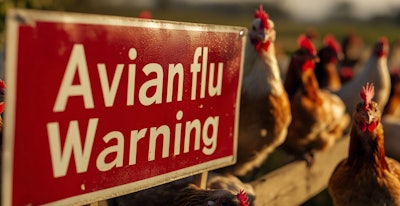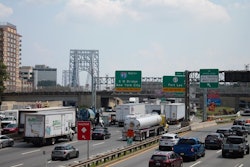
The spread of highly pathogenic avian influenza (HPAI) prompted the Federal Motor Carrier Safety Administration to declare a regional emergency, granting some drivers and carriers relief from some regulatory requirements in Parts 390-399 of the agency's regulations.
The declaration is in effect until the end of the emergency or until 11:59 p.m.. (ET), March 10, whichever is earlier.
This declaration comes as HPAI has caused the loss of chicken flocks, which threatens the national food supply including the supply of eggs. The disease also is a threat to human life, public safety, and public welfare. FMCSA said this declaration addresses the emergency conditions creating a need for immediate interstate transportation of live chickens from highly impacted areas.
California, Iowa, and Louisiana issued emergency declarations related to HPAI; each of these declarations resulted in up to 14 days of emergency relief. Because emergency conditions related to HPAI have not abated and have arisen in other states, FMCSA issued the regional emergency.
This declaration provides regulatory relief for commercial motor vehicle operations providing direct assistance supporting emergency relief efforts involving transportation of live chickens from areas impacted by HPAI to unaffected areas. Direct assistance does not include routine commercial deliveries, including mixed loads with a nominal quantity of qualifying emergency relief added to obtain the benefits of this emergency declaration.
Motor carriers and drivers providing direct assistance to the emergency are subject to the following restrictions and conditions:
- Before dispatch the motor carrier must have a valid agreement from the receiving facility to accept delivery of the live chickens
- A driver must not drive more than 16 hours in any 24-hour period
- The driver must stop all driving at midnight each day
- The driver must take a minimum of a six-hour break in a sleeper berth before resuming any driving
- Drivers must use paper records of duty status (RODS) and supporting documents, maintain RODS and supporting documents for six months from the date the record is prepared, and make RODS and supporting documents accessible to FMCSA and law enforcement upon request
- Drivers must maintain a valid commercial driver’s license and not be subject to an out-of-service order or loss of driving privileges
- Motor carriers or drivers currently subject to an out-of-service order are not eligible for the relief granted by this waiver until they have met the applicable conditions for its rescission and the order has been rescinded in writing by the issuing jurisdiction
- Motor carriers and drivers must comply with all applicable federal and state requirements such as U.S. Department of Agriculture and state departments of agriculture requirements for transporting live chickens, and obtain any necessary authority to load, transport, and deliver the live chickens, and carrying all required documentation
- Motor carriers and drivers must, before transport begins, ensure that they have any and all approvals necessary for the loading, transport, and delivery of the live chickens
- Motor carriers and drivers covered by this waiver must comply with all other applicable provisions of the Federal Motor Carrier Safety Regulations








